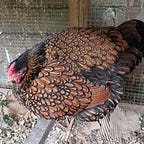Marginality In Society
My Introduction to Permaculture was done with Nick Ritar of Milkwood. One of the things he described while talking about permaculture was that it was a range of practises on a scale. There were those who practised as much as they possibly could, and those who didn’t practise it at all. At one end was a complete disregard for the natural world and the way things had been, at the other was a complete disdain of modern processes and advantages. He didn’t want to be at either extreme, but somewhere between them — preferably at the practising more end than the practising less.
In many ways, all of permaculture is on the edge, marginal in our western society of ‘human productivity’ and ‘waste and disposable everything’. We live between the acceptance of how things are — how we reached this point — and the refusal to let it keep going like this forever.
Are there times to rebel against political authority? Of course. Are there times to submit to it? Certainly.
But knowing which to do and when to do it? That requires wisdom and discernment.
It also means leaving your ego behind, and not throwing the baby of society out with the bathwater of our bad practises developed under capitalism.
Just because we value the marginal doesn’t mean we throw out the mainstream wholesale. There are some people who need produced chemicals to survive. A big government is able to make big declarations and shove a society in a direction that it needs to go. And petrochemicals have lifted the standard of living for billions in the time that we began using them.
Sometimes the problem isn’t what the mainstream is doing but how mainstream thought looks at the situation.
‘Using pharmaceuticals to survive’ is one thing; ‘a chemical for every problem’ is another.
‘Big government to make big changes’ is one thing; ‘big government to enable big money’ is another.
‘Petrochemicals to fuel human development’ is one thing; ‘petrochemicals as an easy resource to be drained to the very last drop’ is another matter entirely.
Living in the edges, on the margins, means thinking about these things in a new fashion. Working out which parts of the ‘old world’ we can take with us as we try to find our way back to the ‘even older world’ of putting back into the land, reusing, recycling, remaking, that is so different from our throwaway culture, while still keeping hold of the things that enabled our society to care more broadly for others, to give people like me — female, racial minority, unmarried, childless: a litany of things that would make me a lower-caste in any other society — a chance to be more.
Permaculture is marginal in our society, there’s no argument about that, and excellent things have happened in the permaculture space. But also, within permaculture, we shouldn’t hold an “all or nothing” mindset. We need to live in the careful space between the absolutes of “renounce the world and all it’s sin” and “bathe in capitalist depravity”.
There’s growth there and opportunity, if we’re discerning enough to see it.
